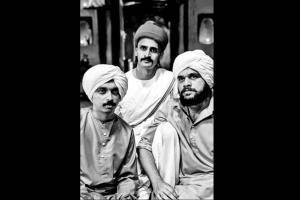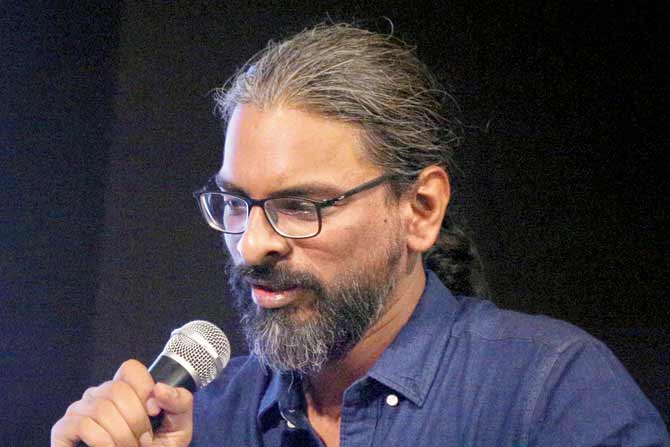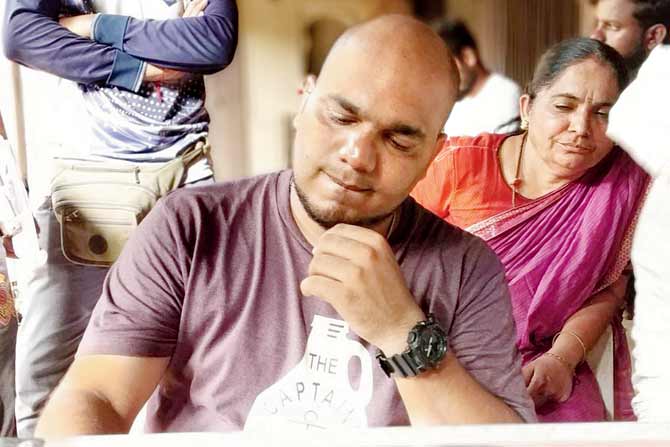Be it a story of a serial killer or a freedom fighter, fiction is getting a tough fight from real-life stories that are taking over OTT platforms

Still from Gondya Ala Re
Earlier this year, we all watched Delhi Crime, which is about the 2012 Nirbhaya rape case, and were left overwhelmed. We were also, to a certain degree, amazed that something like this could happen in real life. Or Mindhunter, in which the FBI's behavioural science unit goes to meet serial killers to know what lies beneath a killer's mind. And, we discovered that the cliche is true: fact is stranger than fiction. It's this old adage that the OTT platform ZEE5 is banking on, by focusing on content based on true events. Be it Kaafir, in which a young Pakistani mother, who comes to India, is accused of being a terrorist; Gondya Ala Re, the story of the first armed revolution by the youth of the country, led by the Chapekar brothers; Barot House, about a child serial killer; or Rangbaaz, based on gangster Shiv Prakash Shukla: all stories are ones that require intense research.
ADVERTISEMENT
For Gondya Ala Re, a show on Damodar Hari Chapekar, Balkrishna Hari Chapekar and Vasudeo Hari Chapekar, director Ankur Kakatkar took almost two years to research. The story of the Pune brothers, who were involved in the assassination of WC Rand, the British plague commissioner of Pune, was a vast one. "I knew them from my school books, but later they vanished from the MPSC syllabus. Then, in 2017, the prime minister mentioned them in the Lok Sabha and my interest piqued again," says Kakatkar, who is also from Pune. He started reading about them, including getting his hands on out-of-print autobiographies and hard-to-access court documents. "It was all jugaad, as it was very hard to get those documents from the court," says the 35-year-old filmmaker, who has also written the show. "Once I started making the show, their fourth generations got in touch, so we talked to them as well. But, eventually I knew more about them than anyone else. They were unsung heroes. Freedom fighters like Bhagat Singh and Veer Savarkar followed their cue. I wanted to make them more than just a paragraph in a history book." The writer traced their journey from 1892 to 1899 in the show, which stars Bhushan Pradhan, Anand Ingale and Sunil Barve.

A still from Barot House
But, along with freedom fighters, even the stories of serial killers get told. In Barot House, Sanjeev K Jha, the UP writer who wrote last month's Jabariya Jodi, had to enter the mind of a serial killer; that, too, a teenage one.
The show is based on different cases of serial killings across India of children, all allegedly by killers, who fell in the 14-18 age group. One took place in Maharashtra, one in Bihar. "For this show, I read a lot of serial killer novels and watched Mindhunter. I decided to go deep into the psyche of a troubled child, and had to question his parenting. So, this became a story about a father and son. When our children do wrong, aren't we the first ones to cover it?" says the 32-year-old writer, who feels that real-life stories are serving something useful to the audience. "I also found out interesting things during my research. Did you know that when serial killers are unsuccessful, they self-harm? We tried to keep it free of too much gore or sexual content, as it's more about psychology."

A still from Kaafir
In Rangbaaz, in place of a serial killer, is a gangster, who, as writer Siddharth Mishra says, is also a father, son and boyfriend. Rangbaaz is the story of Rajashtan's infamous gangster Shiv Prakash Shukla. "The story is not just about a gangster, but about caste politics and state politics that were in effect then. What made a farmer's son, who was studying to be an IAS officer, become a gangster instead? We had to know his surroundings and his equations with people," says the 38-year-old, who spoke to old-school journalists (active in the '90s) to know more while also travelling and meeting his acquaintances. "We haven't tried to justify anything, but you have to show the human element, and that only comes with research," he says. "You have to maintain a balance."

Siddharth Mishra writer, Rangbaaz
And, that could be the most important part of telling a true story: to make sure all sides are told. Just like a journalist, who reports both sides of the story, these writers and directors are trying to bring the truth to fore. As Sonam Nair, director of Kaafir, says, "With a movie like this, which is about a Pakistani woman who was called a terrorist because she got stuck in India, political implications are big. Everyone is scared to make the movie. That's why all the facts have to be in place. We got information from the real lady, who is played by Dia Mirza, and details from the lawyer defending her. We didn't make a movie about India or Pakistan; it's fair and balanced. It's eventually a human story."

Ankur Kakatkar, director, Gondya Ala Re
Catch up on all the latest Mumbai news, crime news, current affairs, and also a complete guide on Mumbai from food to things to do and events across the city here. Also download the new mid-day Android and iOS apps to get latest updates
 Subscribe today by clicking the link and stay updated with the latest news!" Click here!
Subscribe today by clicking the link and stay updated with the latest news!" Click here!






